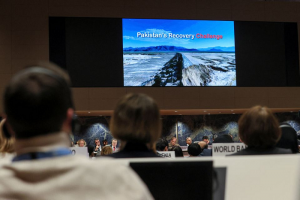The question at the donors meeting is: Will the pledges be fulfilled?
Fawad inquires as to the rationale behind the decision to send the entire cabinet to Geneva for what was “practically a virtual conference.”

ISLAMABAD:
Even though the international community, including friendly states and institutions, overwhelmingly responded to Pakistan’s appeal by pledging over $10 billion for the recovery of flood-hit areas at the International Conference on Climate Resilient in Geneva on Monday, the likelihood that donors will honour their commitments is low, primarily due to the domestic political situation and secondly, if the country showed a relaxed approach moving forward.
Pakistan’s financial situation is well known. Due to the rapidly increasing amount of money required in the wake of last year’s terrible floods, it sought financial aid from the international community.
The world has clearly given Pakistan its backing, but it remains to be seen whether Pakistan can safeguard these promises against political upheaval during the election year and offer donors financing for development projects when the planning ministry lacks authority.
“The world is displaying confidence. Reputable expert on climate change and development Ali Tauqeer Sheikh said, “We need to demonstrate our reliability. Pakistan will receive the promised money for the next three years, but it all depends on how the country moves forward from here.
Planning, disbursement of the funds, and their impact will put Pakistan to the test.
In order for the obligations to be fulfilled in full, the climate change expert emphasised the importance of spending the money “speedily with purpose.”
“Pledges can only continue to materialise if Pakistan is able to spend swiftly and demonstrate its impact,” Sheikh said, adding that prospects were good that the international community might contribute more provided the trend was maintained.
However, he added that “Pakistan’s domestic situation is not ideal” and warned that “if the government changes, things may be delayed or fail to materialise in the upcoming years.”
Sheikh said that no one should raise an issue if, as in the past, the relevant authorities even failed to open bank accounts for months.
Former Board of Investment (BoI) chairman Haroon Sharif discussed the situation and praised the support received from the international community.
“Our ability to establish schemes and manage them is inadequate while the Ministry of Planning cannot do it as most of this is in the provincial domain,” the ex-BoI head said. “Most of the money comes through multilateral banks which will need projects to finance.”
According to Sharif, a unit run by the private sector might provide the project with bankers, engineers, and climate experts.
We need a strong independent institution to handle it, Sharif said, adding that “elections are approaching in 2023, so these institutions will spend time planning and see how Pakistan can insulate these pledges from political change.”
In an interview with The Express Tribune, PTI senior vice president Fawad Chaudhry stated, “First we need to discover what happened to the pledges Bilawal Bhutto Zardari asserted.
“As much as we want these promises to be fulfilled. It will be challenging to believe all the announcements because of this government’s track record and the low level of public confidence in the ruling class.
The PTI leader questioned why, considering that it was “practically a virtual conference,” the whole cabinet chose to travel to Geneva rather than Islamabad.
The PTI leader criticised the premier for lavish expenditure on the trip to Geneva, calling the donor meeting a “flop.” Fawad claimed that although the money did not arrive, the visit of the premier and his cabinet cost hundreds of thousands of dollars.
Pakistan is one of the nations that endures unending misery as a result of the climate-related rains and floods that affected more than 33 million people there last year.
According to experts, a lot depends on what the current or following administration does to aid the victims of the recent rain and flooding and increase resilience.
Despite the fact that experts see the global promises favourably, they point out that wealthy nations have historically fallen short of a long-standing commitment to provide $100 billion to assist poorer countries in coping with climate change.
Additionally, they claimed that the plans made by the international governments to reduce emissions in the next years would not be sufficient to stop catastrophic climate change.
The experts said that pledging might help unlock agreement on important issues but noted that it was too early to tell whether it would result in positive change for the environment and those affected by climate change. They did this by citing the past performance of the global pledgers, who failed to generate finances and reduce emissions.
Sheikh noted that earlier the world had pledged for Ukraine, Syria, and other countries, “but the difference is that this time it is for climate loss.” “This is the first time the world has acknowledged climate loss and set a new precedent by pledging billions of dollars for the victims of rains and floods in Pakistan,” Sheikh said.
Experts agreed that the Pakistani government received a lot of support from the international community for the flood victims after they saw the government’s readiness to assist people, saying that this was not only good for the flood victims in Pakistan but also for the democracy in the nation.
The highest civil and military leadership of Pakistan demonstrated the other day that it was prepared to confront terrorism and would not even hesitate to carry out cross-border strikes, according to Sheikh, who gave a justification for the international pledges.
An ex-state minister who worked to attract investment to Pakistan claimed that authorities there did not stick to deadlines and adopted a relaxed attitude, noting that there were moments when it appeared as though they did not even have the capacity to work.
He asked for anonymity and claimed that previous administrations had failed to “take up the low-hanging fruit” because of their employees’ complacency, which had caused excessive delays.










































